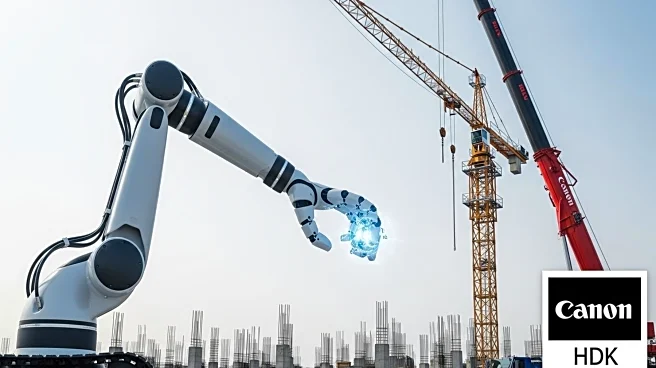What is the story about?
What's Happening?
The construction industry is increasingly integrating artificial intelligence (AI) to enhance workforce capabilities and improve project outcomes. This integration is seen as a way to balance traditional construction practices with modern technological advancements. AI is being used to transform how construction projects are planned, executed, and managed, offering tools such as AI-powered project management platforms, drone-based site mapping, and augmented reality for design visualization. These technologies are not only attracting younger, tech-savvy talent but also empowering experienced workers by making their roles more efficient and rewarding. The industry consensus suggests that AI will not replace jobs but will instead enhance them, allowing workers to focus on more strategic and problem-solving tasks.
Why It's Important?
The integration of AI in construction is significant as it addresses the industry's need for increased efficiency, productivity, and innovation. By automating repetitive tasks and improving decision-making processes, AI helps reduce manual planning and optimize resource allocation. This leads to better project outcomes and streamlined workflows, which are crucial for maintaining competitiveness in the construction sector. Additionally, the use of AI can help attract and retain talent by positioning the industry as dynamic and future-ready. This technological shift is expected to foster a culture of innovation and collaboration, ultimately enhancing job satisfaction and reducing turnover.
What's Next?
As AI continues to be integrated into construction, companies will need to invest in comprehensive training programs to ensure workers can effectively utilize these new tools. This includes bridging the gap between traditional construction skills and AI applications. The focus will be on creating a balanced approach where human expertise and AI-driven efficiency complement each other. Companies that successfully embrace this human-AI partnership are likely to see improved project delivery, higher quality standards, and continuous improvement in their operations.
Beyond the Headlines
The adoption of AI in construction also raises ethical and cultural considerations. There is a need for continuous education to prevent over-reliance on technology and to ensure that human oversight remains a critical component of the decision-making process. This balance is essential for maintaining critical thinking, adaptability, and nuanced problem-solving skills that AI cannot replace. Furthermore, the integration of AI is expected to drive a shift towards a more collaborative and innovative work environment, where both human expertise and AI are valued equally.














